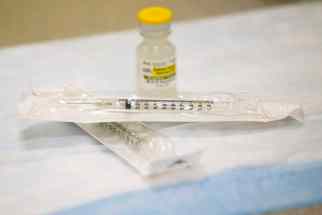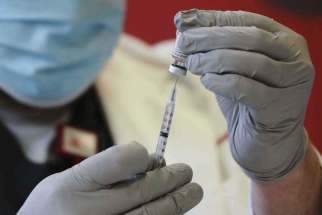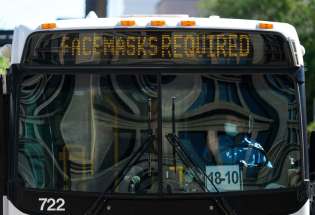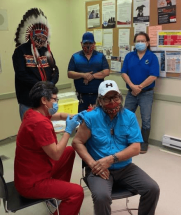Spectre of vaccine hesitancy haunts health care
Read this article for free:
or
Already have an account? Log in here »
To continue reading, please subscribe:
Monthly Digital Subscription
$0 for the first 4 weeks*
- Enjoy unlimited reading on winnipegfreepress.com
- Read the E-Edition, our digital replica newspaper
- Access News Break, our award-winning app
- Play interactive puzzles
*No charge for 4 weeks then price increases to the regular rate of $19.00 plus GST every four weeks. Offer available to new and qualified returning subscribers only. Cancel any time.
Monthly Digital Subscription
$4.75/week*
- Enjoy unlimited reading on winnipegfreepress.com
- Read the E-Edition, our digital replica newspaper
- Access News Break, our award-winning app
- Play interactive puzzles
*Billed as $19 plus GST every four weeks. Cancel any time.
To continue reading, please subscribe:
Add Free Press access to your Brandon Sun subscription for only an additional
$1 for the first 4 weeks*
*Your next subscription payment will increase by $1.00 and you will be charged $16.99 plus GST for four weeks. After four weeks, your payment will increase to $23.99 plus GST every four weeks.
Read unlimited articles for free today:
or
Already have an account? Log in here »
Hey there, time traveller!
This article was published 07/01/2021 (1802 days ago), so information in it may no longer be current.
It’s one of the worst possible scenarios, at arguably the worst possible time.
All over the world, there is increasing evidence some toiling on the front lines of health care are hesitant about being vaccinated against COVID-19.
In the United Kingdom, the National Care Association, a lobby group that represents long-term care facilities, said as many as 40 per cent of its employees may opt out of the vaccine program.
California’s Riverside County, which includes urban centres such as Palm Springs, has said up to 50 per cent of hospital workers may refuse to be vaccinated. New York Gov. Andrew Cuomo said this week public health officials believe up to 30 per cent of employees in area nursing homes and hospitals will refuse any type of COVID-19 vaccine.
Similar stories have erupted in Houston, Los Angeles, Chicago, and in statewide across Ohio. In Spain, government officials are so concerned about hesitancy, they’ve threatened to create a registry of anyone who refuses COVID-19 vaccination and share it with other European nations.
Could the same thing happen in Canada?
Recent polls show up to one-third of Canadians are somewhat hesitant to receive a COVID-19 vaccine. In some provinces, uptake on annual flu shots by hospital staff has been about 50 per cent, prompting a concern a similar vaccination rate for COVID-19 shots would leave a great many exposed to the novel coronavirus.
Recent polls show up to one-third of Canadians are somewhat hesitant to receive a COVID-19 vaccine. In some provinces, uptake on annual flu shots by hospital staff has been about 50 per cent, prompting a concern a similar vaccination rate for COVID-19 shots would leave a great many exposed to the novel coronavirus.
Fortunately, although many concerns have been expressed, there are few examples of broad vaccine hesitancy among health-care workers, including those in Manitoba.
Although senior provincial government sources confirmed there has been some recent, pointed discussions about health-care workers possibly rejecting the vaccine, officially there is no evidence to backup those concerns.
Given all health-care workers eligible to receive the vaccine must voluntarily sign up for an appointment, it’s hard to see how anyone could track refusals; the only way to “refuse” a vaccine is to not make an appointment.
Spokespersons from Doctors Manitoba and the Manitoba Nurses Union said there is no evidence, anecdotal or otherwise, suggesting any significant degree of vaccine hesitancy.
“The only whiff of reluctance we’ve heard from physicians is a recognition from some that it’s a limited resource and even though they’re eligible, they’re going to wait to allow others in greater need to get it.”
– Keir Johnson, director of communication at Doctors Manitoba
Keir Johnson, director of communication at Doctors Manitoba, said the preliminary results of a profession-wide survey of nearly 3,000 physicians has failed to identify any refusals on philosophical or medical grounds.
“The only whiff of reluctance we’ve heard from physicians is a recognition from some that it’s a limited resource and even though they’re eligible, they’re going to wait to allow others in greater need to get it,” he said.
Those preliminary findings were echoed Wednesday evening, when Doctors Manitoba hosted a live webinar with senior provincial public health officials, Johnson added. More than 400 physicians attended and not a single participant expressed any philosophical opposition to receiving the vaccine.
MNU president Darlene Jackson said she has not talked directly with any nurses who have said they would refuse: “Nurses are health-care professionals and we believe in science.”
However, even though vaccine hesitancy is not seen as a problem in Manitoba, the groups representing doctors and nurses are still concerned many members could be delayed or prevented from getting the vaccine.
Doctors, nurses and others in health care eligible to be vaccinated have been forced to stay on hold for hours to register for an appointment. Those fortunate enough to secure a booking are forced to travel to the immunization “super site” at the Winnipeg RBC Convention Centre.
The system set up by the province to help front-line health-care workers register for COVID-19 vaccinations has been, to put it mildly, a disaster.
Doctors, nurses and others in health care eligible to be vaccinated have been forced to stay on hold for hours to register for an appointment. Those fortunate enough to secure a booking are forced to travel to the immunization “super site” at the Winnipeg RBC Convention Centre.
Jackson said the time involved is preventing a lot of nurses working directly with COVID-19 patients from getting the vaccine. “We are in a critical nursing shortage and a lot of nurses simply can’t afford to take the time off right now to get vaccinated.”
Both the MNU and Doctors Manitoba would like to see vaccinations of staff performed at health-care facilities. To date, that has been a logistical challenge as the Pfizer-BioNTech vaccine, first to be available in Manitoba, has to be stored in ultra-cold conditions.
However, that should change as public health officials gain more experience handling the Pfizer vaccine and other vaccines that do not require the same storage limits become available.
A spokeswoman for Manitoba Health said while the province will rely on its super sites for now, it will start vaccinating patients in long-term care facilities, and other satellite locations could follow once supplies increase.
For those health-care workers most exposed to COVID-19, something will have to give, and soon.
“We have to make the vaccines more accessible,” Jackson said. “Otherwise, we run the risk of leaving a lot of people exposed to this virus.”
dan.lett@freepress.mb.ca

Born and raised in and around Toronto, Dan Lett came to Winnipeg in 1986, less than a year out of journalism school with a lifelong dream to be a newspaper reporter.
Our newsroom depends on a growing audience of readers to power our journalism. If you are not a paid reader, please consider becoming a subscriber.
Our newsroom depends on its audience of readers to power our journalism. Thank you for your support.







